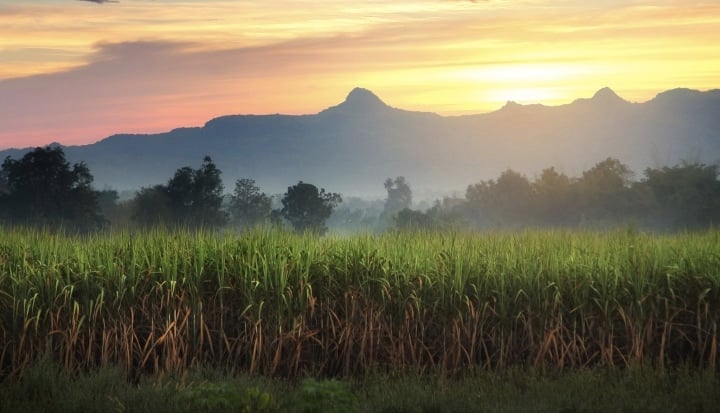A stormy history
It’s widely believed that rum as we know it today, was first distilled on sugarcane plantations in the 17th century. The history of sugarcane and its by-products, including rum, is closely entwined with the slave trade. Enslaved people were made to grow and cut sugarcane in appalling conditions, work tirelessly to ferment, and distil molasses to make the rum, which was then used as currency to buy more slaves – a vicious cycle.
Although the trans-Atlantic slave trade stopped in the 19th century, modern-slavery still exists – particularly in agricultural and textile supply chains. People from disadvantaged communities in many countries often work long hours, under poor conditions for very little money; a societal and economic structure that echoes that of slavery. And unfortunately, these practices can be found on some sugarcane farms, mirroring the harsh history of this industry. According to the US Department of Labor, child labour is prevalent in sugarcane production 18 countries. And on some farms, workers cut cane manually under intense heat which poses a big health risk. There’s increasing evidence (including from the Pan-American Health Organization) that heat stress can lead to development of a chronic and often fatal kidney disease.
A global drink
The global rum market is thriving. According to Market Data Forecast, it was worth $15bn in 2020 and it’s predicted to grow to $21.5bn by 2025. The industry has firm roots in the Caribbean, but it’s also produced and enjoyed across the world. I was surprised to see Euromonitor International report that India tops the international rum market.
Rum is also increasingly popular in Europe. Dark rum in particular is a trendy product in the Nordic countries, where the governments run monopolies for buying and selling alcohol, including rum. It was a positive step to see that, at the end of April, the Nordic Alcohol Monopolies signed a joint statement on their commitment to sourcing rum responsibly. I’m glad to see governmental entities make a public commitment and draw attention to risks in sugarcane and rum production.
Addressing social sustainability
There are plenty of examples of sugarcane producers that offer workers fair wages, safe working conditions and adhere to the law. I work for Bonsucro, the global sustainability platform for sugarcane, and this is exactly what we promote.
We developed a set of strict social and environmental criteria to establish a global sustainability standard for sugarcane, that producers can be certified against. It stipulates that workers are given adequate personal protective equipment, are paid minimum wage and that contracts are issued. It also requires health and safety procedures to be in place and has no tolerance for child or forced labour. The environmental criteria in the standard help farms and sugarcane mills to reduce their water and agrochemical use, and reduce CO2 emissions. In fact, scientific models indicate that global adoption of the Bonsucro Standard would halve GHG emissions by 51%, and reduce water use by 65% and nutrient loading by 34%.
Through training, sharing information and our certification system, we promote safe working conditions for workers on farms to prevent heat stress, dehydration and accidents. We’re a founding member of the Adelante Initiative – a multistakeholder initiative to develop safer working practices, such as implementing a protocol to ensure workers that cut cane by hand (some is cut with machines) take sufficient breaks, with water in a shaded spot to protect their health and prevent the development of kidney disease.
Building a community of responsibly sourced rum producers
At Bonsucro, we take a convening role – we bring people together from sugarcane supply chains (including rum) to address these key sustainability challenges and raise standards of production. It has been positive to see that in the past year, there’s been noticeably more interest in Bonsucro from rum producers. Over 25% of our new member applicants since the beginning of 2021 are rum brands or distilleries and include Mount Gay Distilleries and SASMA B.V. We are also seeing demands to highlight sustainability credentials on rum bottles. Last year, ED&F Man was the first organisation to put the Bonsucro certified sustainable sugarcane logo on two lines of rum – Bonfier and James Man.
While this surge in interest is encouraging, we have worked with rum producers and brands for years – Bacardi Limited has been a member since 2007. In fact, the team at Bacardi Limited set a goal in 2013 for 100% of their suppliers to be Bonsucro-certified which they achieved last year – three and a half years early! Other members include Pernod Ricard, West Indies Rum Distillery, Cacharia Leblon, and Diageo. We encourage our members to talk about their sustainability achievements and successes – in their sustainability reports but also on their websites and in consumer messaging. A healthy competition to be the most sustainable rum brand is no bad thing.
Continuous improvement
I’m happy that engagement with Bonsucro is growing, but we need to recognise that the interest in sustainability and ethical labour standards is not keeping up with the rapidly increasing global demand for rum – much of the market is not yet talking about sustainability.
At Bonsucro, we believe in continuous improvement, and always strive to do more. We also expect the same of our members. Brands that are committed to Bonsucro can go further: they can support producers to implement sustainable farming practices or collaborate with us on impact projects. The Nordic Alcohol Monopolies have taken an important and proactive first step, next I’d like to see them add Bonsucro certification as a requirement on their tenders and communicating their commitments to consumers in their stores.
Value chains are complex and it’s easy to lose visibility of raw materials. But I believe it’s important for brands to investigate their supply chains and undertake thorough due diligence measures.
To make change we need to bring together government organisations (like the monopolies), producers, brands and consumers and ensure that at every level there is responsibility in the rum sector.










